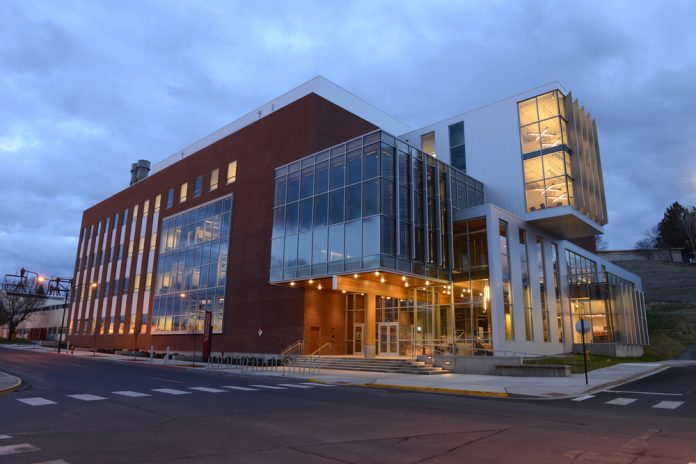Washington State University students will soon have the chance to tackle what arguably may be one of the biggest 21stcentury challenges – how to effectively design and build more high-performing, energy-efficient housing — thanks to support from a new Department of Energy curriculum development grant.
A WSU team, led by Omar Al-Hassawi, assistant professor in the School of Design and Construction received a 3-year, $750,000 grant to develop a curriculum for building science certificates and a degree focused on energy-efficient housing. The new program aims to close a gap in comprehensive energy efficiency training for students as well as for professionals who are already in the workforce.
Residential housing is one of the biggest contributors to carbon emissions and climate change, accounting for 23% of all energy use in Washington, said Al-Hassawi. The state’s 2020 version of its residential energy code is considered one of the most rigorous in the United States, upping requirements for energy efficiency in everything from windows to insulation.
“I keep telling the students that they’re going to be the ones who are making these decisions and designs,” Al-Hassawi said. “Those lines on a piece of paper will have long-lasting impacts 50 years to 100 years into the future. We need to emphasize the importance of energy efficiency to our students and just what a building’s impact is on the environment, so that it becomes embedded in their process.”
“These students are the next generation of designers and construction specialists who are going to be responsible for innovations in existing construction that are going to happen.”
The courses will provide training in areas such as using energy modeling and simulation software, understanding of mechanical systems that impact a building’s performance, integration of smart technologies, and evaluation of the energy performance in buildings.
“This is an area that has been underserved by current higher education and continuing education offerings,” he said.
WSU’s Voiland College of Engineering and Architecture has a unique opportunity to provide the comprehensive multi-disciplinary approach that is needed to tackle the energy challenge, said Al-Hassawi. It is one of only five universities in the U.S. that combine engineering and architecture in a single college and the only one of the five to include all major design disciplines for the built environment. A multi-disciplinary team that includes researchers from civil engineering, mechanical engineering, architecture, and construction management are developing the undergraduate and graduate certificate programs as well as the master’s degree program. Many of the courses will be online making them accessible to a wider audience, and more specialized than traditional degree programs.
The team is collaborating with WSU’s Extension Energy Program, McKinstry, a Seattle-based construction and engineering company, King County’s Housing Development Consortium, and Pacific Northwest National Laboratory’s Energy Efficiency program on development of the courses, which they anticipate to start offering in January 2023. WSU team members include Ryan Smith, Julia Day, David Drake, Taiji Miyasaka, and Max Kirk from the School of Design and Construction, Don Bender from the Department of Civil and Environmental Engineering, Dustin McLarty from the School of Mechanical and Materials Engineering, Michael Lubliner and Carolyn Roos from the WSU Energy Program, and Suzanne Hamada from the Composite Materials and Engineering Center.
Decision-making concerning campus operations will continue to be informed by data and guidance from state and county health agencies.
Decision-making concerning campus operations will continue to be informed by data and guidance from state and county health agencies.
If embraced by the legislature, WSU would receive about $4.44 million annually in state support to establish two new academic programs to help meet the state’s cybersecurity workforce needs for the future.
Would‑be passengers can schedule their pickups by using a new website put together by airport officials. The shuttle collects riders at 3:15 a.m. near the Fine Arts Parking Garage on the WSU Pullman campus.
Senior Joey McDonald’s dream is to help improve the lives of people like his father, who died in 2021 due to complications from a gunshot wound that left him paralyzed.
Over the course of a year, more than 18 million emails with suspect links, attempts to capture personal or protected information, and other threats are kept out of employee’s inboxes.
While attractive hospitality workers typically earn higher customer service scores than their peers, wearing face masks—a practice widely adopted during the COVID‑19 pandemic—levels the playing field, a new study says.
Subscribe to WSU Insider to receive free daily updates by email. University employees are automatically subscribed—no sign up is necessary.
Zenna Glaser and Claudia B. Jacobo have been awarded the Benjamin A. Gilman International Scholarship, which is designed to help American students gain proficiency in diverse languages.
Soil sciences graduate student Molly McIlquham took first place in the graduate student category of The Science Coalition’s third‑annual Fund It Forward Student Video Challenge.






